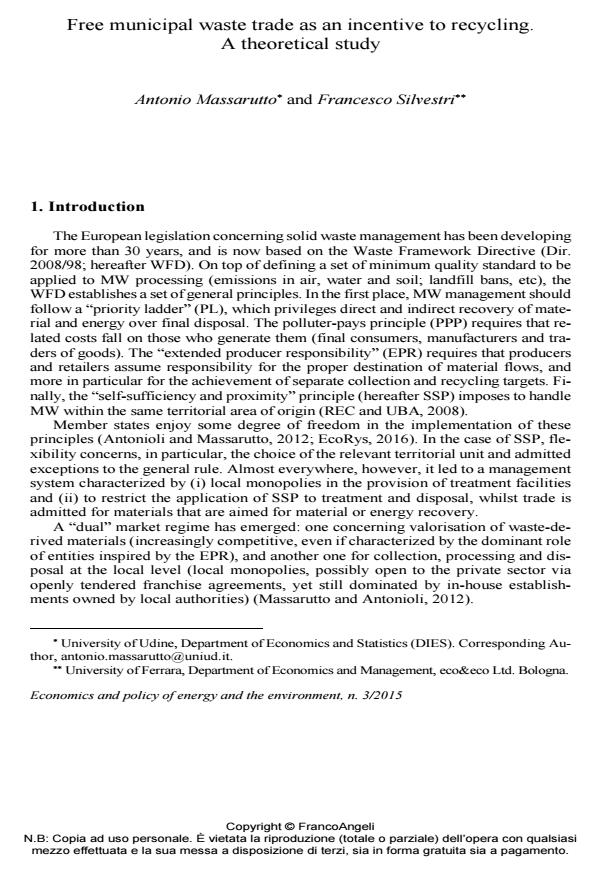Free municipal waste trade as an incentive to recycling. A theoretical study
Titolo Rivista ECONOMICS AND POLICY OF ENERGY AND THE ENVIRONMENT
Autori/Curatori Antonio Massarutto, Francesco Silvestri
Anno di pubblicazione 2016 Fascicolo 2015/3
Lingua Inglese Numero pagine 19 P. 89-107 Dimensione file 739 KB
DOI 10.3280/EFE2015-003005
Il DOI è il codice a barre della proprietà intellettuale: per saperne di più
clicca qui
Qui sotto puoi vedere in anteprima la prima pagina di questo articolo.
Se questo articolo ti interessa, lo puoi acquistare (e scaricare in formato pdf) seguendo le facili indicazioni per acquistare il download credit. Acquista Download Credits per scaricare questo Articolo in formato PDF

FrancoAngeli è membro della Publishers International Linking Association, Inc (PILA)associazione indipendente e non profit per facilitare (attraverso i servizi tecnologici implementati da CrossRef.org) l’accesso degli studiosi ai contenuti digitali nelle pubblicazioni professionali e scientifiche
According to the Self-Sufficiency and Proximity Principle (SSP), municipal waste (MW) disposal has to be confined within delimited territorial zones, with no trade allowed. The justification is usually the need to make each community aware of its environmental responsibility and discourage diversion of MW to "waste havens". In this paper, we explore the possible benefits associated with some opening to MW treatment service trade. We assume that some areas are equipped with MW treatment facilities, while others are not. We demonstrate, under standard assumptions, that removing SSP and allowing trade of MW disposal services between such regions may foster MW selection in both areas. This is true not only when disposal capacity is constrained, so that a part of the original demand for MW diversion is unsatisfied, but also when it is unconstrained and can accommodate all the residual unsorted MW, provided that the design of rewarding schemes is appropriate. On the contrary, if both districts were equipped with a facility, the same would not be true, and each one would be more willing to exploit the plant’s capacity before engaging in efforts to reduce waste. JEL classification: olid waste, waste management, disposal facilities, waste trade, regulated markets.
Parole chiave:L43, L99, Q53, R11
- A circular economy model based on biomethane: What are the opportunities for the municipality of Rome and beyond? Idiano D’Adamo, Pasquale Marcello Falcone, Donald Huisingh, Piergiuseppe Morone, in Renewable Energy /2021 pp.1660
DOI: 10.1016/j.renene.2020.10.072 - Direct and indirect effects of EU Self Sufficiency Principle on Municipal Waste Management: A theoretical approach Francesco Silvestri, in ECONOMIA PUBBLICA 1/2019 pp.89
DOI: 10.3280/EP2019-001005
Antonio Massarutto, Francesco Silvestri, Free municipal waste trade as an incentive to recycling. A theoretical study in "ECONOMICS AND POLICY OF ENERGY AND THE ENVIRONMENT" 3/2015, pp 89-107, DOI: 10.3280/EFE2015-003005